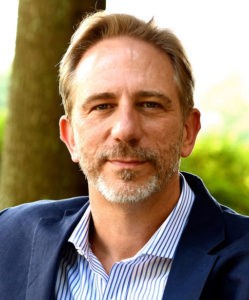After a year of researching the matter rather deeply — including listening to conservative scholars, activists and politicians — it has become completely clear to me that a significant chunk of conservative Christians in the United States has moved from political disenchantment to a full-on radicalization that threatens our democracy.
I am not just talking about the Christian extremists who invaded the Capitol on January 6. It is a far broader trend, and it involves an entire intellectual movement, not just a bunch of freaks in horns and furs. I will tell the full story of this authoritarian turn, and how the rest of us should respond, in my next book, Defending Democracy from its Christian Enemies out next year from Eerdmans.

David Gushee
For now, here is a diagnostic overview.
The story conservatives are telling themselves is that much of the Western world is in the grip of a disastrous left-liberalism, a toxic stew of godlessness, moral relativism and political aggression. This “woke totalitarianism” dominates the heights of culture, such as academia, entertainment, “news” media, and now much of the business class. It also dominates government, sometimes through elected liberal governments and always through parts of the state that have been captured by liberal ideologues — this is often what is meant when the “administrative state” is decried by conservatives. The high priests of leftist orthodoxy are not satisfied to dominate these terrains, but also want to crush all serious opposition, such as more conservative churches, schools, businesses and so on.
“The story conservatives are telling themselves is that much of the Western world is in the grip of a disastrous left-liberalism.”
This story is told by conservatives not just in the United States but in much of the (post-) Christian western world. While I think it is grossly exaggerated, I encourage my fellow left-leaning friends to take it very seriously, both because of its shards of truth and the powerful motivation it provides its adherents.
To the charge that these conservatives are flirting with authoritarianism and threatening liberal democracy, they respond that it is the left-liberals who already are destroying the freedom of conscience and of lifestyle promised in classic liberal democracy. In one popular formulation, the liberals are actually “illiberals” — and their version of authoritarianism is crushing genuine democracy. This may mean a conservative illiberalism is needed in response. The old niceties of liberal democracy may not be sufficient.
If we trace the perceived crisis back to the 1960s, as many on the Right do, we can see that a variety of counter-progressivism strategies have been attempted. In the U.S., this has included Christian evangelism and missions, Christian Right and “law and order” politics, various forms of conservative retreat from mass culture, compassionate conservatism, Tea Party conservatism, QAnon conspiracism, and then, of course, the inimitable Donald Trump’s aggressive anti-liberalism. January 6 would represent a first major move into actual insurrectionist violence. Although it did not have all the ingredients in place to succeed, it opened the door to legitimizing further acts of violence against the liberal democratic state.
Today, while some U.S. conservatives are still hoping for a Trump 47 revival, it looks to me like the man’s manifest weaknesses and liabilities are becoming clear to many of these conservatives.
So some are looking elsewhere for inspiration. One such source of inspiration has been found in the authoritarian regime of Hungary’s Viktor Orbán, who after 12 years of rule has turned Hungary into a postliberal authoritarian Christian state. Orbán is more competent in every way than Trump ever was and more focused on this extraordinary project. While some conservatives are still talking about cultural retreat, and some are still yearning for Trump II, and some are placing their hope in state governments, and some are drawing inspiration from the ultra-conservative makeup of today’s U.S. Supreme Court, others are seriously exploring post-liberal democratic models for United States government.
About that Supreme Court, one final observation proves most illuminating. Consider this quote from anti-abortion writer Mary Eberstadt, celebrating the overturning of Roe v. Wade this summer. I have added the italics: “In the battles between those who believe the United States to be irredeemable without radical new arrangements and those who do not, a gale wind of momentum has just been sent the latter’s way. … The federalism that remains one of the wonders of the political world came through. It came through in a way that many… had despaired of ever happening again.”
This was in National Review, a mainstream conservative magazine. It is the detail that often tells the tale, and this is a stunning one. Listen closely: irredeemable without radical new arrangements. Eberstadt herself, writing on Aug. 1, 2022, is encouraged, and seems to be signaling to her side: Don’t panic, democracy worked, the Supreme Court just overturned Roe. Believe in American politics and work the system, like usual.
“Democracy is not done with the abortion issue, it seems.”
But political victories in democratic politics are sometimes evanescent. All signs are that a substantial majority of the American public believes the court, the most conservative states and many GOP candidates are overreaching on abortion. A political backlash appears to be growing. Democracy is not done with the abortion issue, it seems. The pro-life side appears destined for some serious setbacks.
Will this mean that talk of “radical new arrangements” will blossom once again?
The fact of the matter is that democracy cannot survive if people are unwilling to stay in the democratic system even when they lose on matters dear to them. If we are democrats when we win, and toy with radical new arrangements when we lose, democracy is doomed.
I do not blame Mary Eberstadt for this language. She is reporting what she has heard. The spirit of “radical new arrangements” is already very much in the air on the Right. Knowing this is so, those of us who believe in democracy will need to do our part to reform and defend it.
David P. Gushee is a leading Christian ethicist. serves as distinguished university professor of Christian Ethics at Mercer University, chair of Christian social ethics at Vrije Universiteit Amsterdam, and senior research fellow at International Baptist Theological Study Centre. He is a past president of both the American Academy of Religion and the Society of Christian Ethics. His latest book is Introducing Christian Ethics. He’s also the author of Kingdom Ethics, After Evangelicalism, and Changing Our Mind: The Landmark Call for Inclusion of LGBTQ Christians. He and his wife, Jeanie, live in Atlanta. Learn more: davidpgushee.com or Facebook.
Related articles:
What happened to American conservatism? Engaging Matthew Continetti’s The Right | Opinion by David Gushee
What’s wrong with the ‘you’re being divisive’ argument | Opinion by Mark Wingfield
In applauding Victor Orban, U.S. conservatives call their shot | Opinion by Rodney Kennedy


